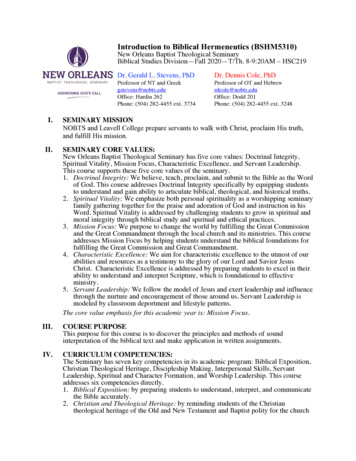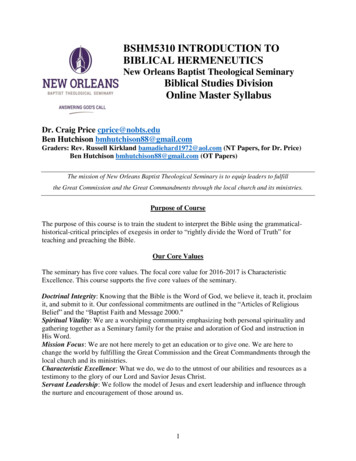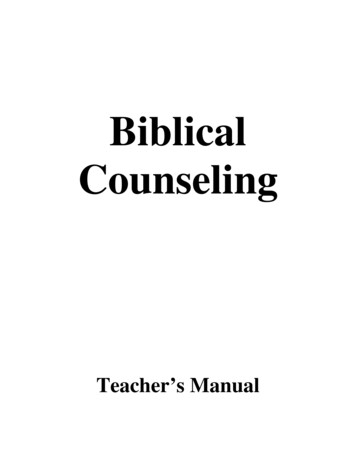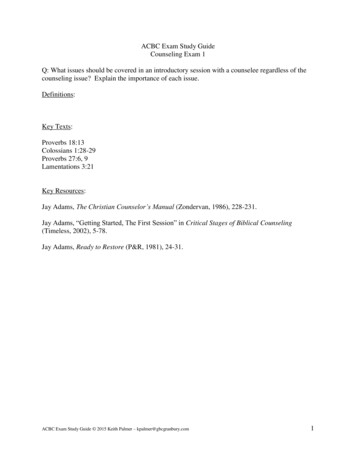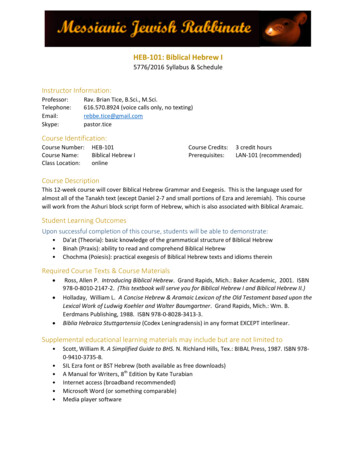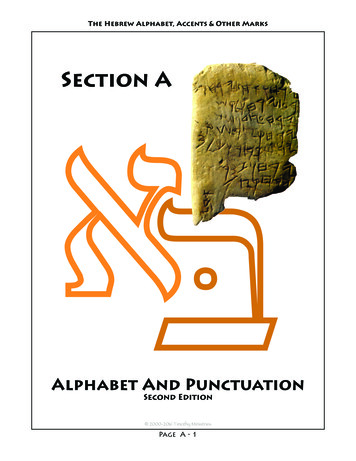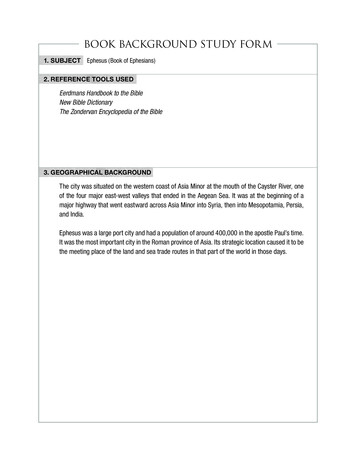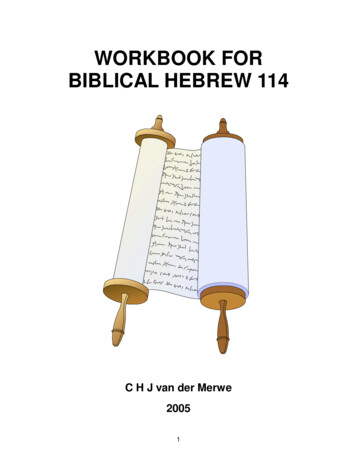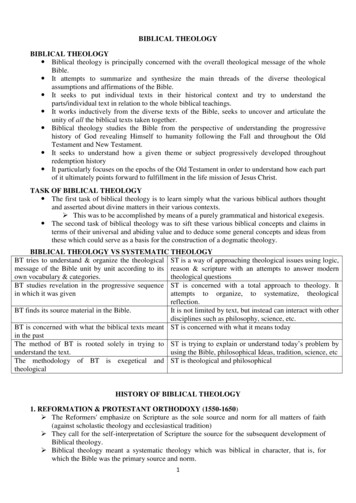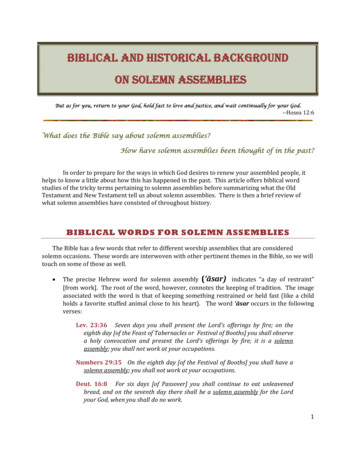
Transcription
BIBLICAL AND HISTORICAL BACKGROUNDON SOLEMN ASSEMBLIESBut as for you, return to your God, hold fast to love and justice, and wait continually for your God.‐‐Hosea 12:6What does the Bible say about solemn assemblies?How have solemn assemblies been thought of in the past?In order to prepare for the ways in which God desires to renew your assembled people, ithelps to know a little about how this has happened in the past. This article offers biblical wordstudies of the tricky terms pertaining to solemn assemblies before summarizing what the OldTestament and New Testament tell us about solemn assemblies. There is then a brief review ofwhat solemn assemblies have consisted of throughout history.BIBLICAL WORDS FOR SOLEMN ASSEMBLIESThe Bible has a few words that refer to different worship assemblies that are consideredsolemn occasions. These words are interwoven with other pertinent themes in the Bible, so we willtouch on some of those as well. The precise Hebrew word for solemn assembly (‘ăsar) indicates “a day of restraint”[from work]. The root of the word, however, connotes the keeping of tradition. The imageassociated with the word is that of keeping something restrained or held fast (like a childholds a favorite stuffed animal close to his heart). The word ‘ăsar occurs in the followingverses:Lev. 23:36 Seven days you shall present the Lord's offerings by fire; on theeighth day [of the Feast of Tabernacles or Festival of Booths] you shall observea holy convocation and present the Lord's offerings by fire; it is a solemnassembly; you shall not work at your occupations.Numbers 29:35 On the eighth day [of the Festival of Booths] you shall have asolemn assembly; you shall not work at your occupations.Deut. 16:8 For six days [of Passover] you shall continue to eat unleavenedbread, and on the seventh day there shall be a solemn assembly for the Lordyour God, when you shall do no work.1
II Kings 10:20 Jehu decreed, "Sanctify a solemn assembly for Baal." So theyproclaimed it.II Chronicles 7:9On the eighth day [of the festivities surrounding thededication of Solomon’s Temple] they held a solemn assembly; for they hadobserved the dedication of the altar seven days and the festival seven days.Nehemiah 8:18 And day by day, from the first day to the last day, he read fromthe book of the law of God. They kept the festival [of Booths] seven days; andon the eighth day there was a solemn assembly, according to the ordinance.Isaiah 1:13 . . . bringing offerings is futile; incense is an abomination to me.New moon and Sabbath and calling of convocation— I cannot endure solemnassemblies with iniquity.Jeremiah 9:2 (used sarcastically) O that I had in the desert a traveler's lodgingplace, that I might leave my people and go away from them! For they are alladulterers, a “solemn assembly” of traitors.Joel 1:14 Sanctify a fast, call a solemn assembly. Gather the elders and all theinhabitants of the land to the house of the Lord your God, and cry out to theLord.Joel 2:15 Blow the trumpet in Zion; sanctify a fast; call a solemn assembly.Amos 5:21 I hate, I despise your festivals, and I take no delight in your solemnassemblies [because their society and everyday dealings are not ordered inaccord with God’s Way of justice and righteousness] The word môw’êd is also used for a solemn assembly, denoting a special, appointed timeset apart for liturgical purposes. It occurs with the connotation of a solemn assembly onone of the high holy days in the following scriptures:Numbers 10:10 Also on your days of rejoicing, at your appointed festivals, andat the beginnings of your months, you shall blow the trumpets over your burntofferings and over your sacrifices of well being; they shall serve as a reminderon your behalf before the Lord your God: I am the Lord your God.Numbers 15:2 5 When you come into the land you are to inhabit, which I amgiving you, and you make an offering by fire to the Lord from the herd or fromthe flock—whether a burnt offering or a sacrifice, to fulfill a vow or as a freewilloffering or at your appointed festivals—to make a pleasing odor for the Lord,then whoever presents such an offering to the Lord shall present also a grainoffering, one tenth of an ephah of choice flour, mixed with one fourth of a hin ofoil. Moreover, you shall offer one fourth of a hin of wine as a drink offering withthe burnt offering or the sacrifice, for each lamb.2
Deuteronomy 31:10 13 Moses commanded them: "Every seventh year, in thescheduled year of remission, during the Festival of Booths, when all Israelcomes to appear before the Lord your God at the place that he will choose, youshall read this law before all Israel in their hearing. Assemble the people—men,women, and children, as well as the aliens residing in your towns—so that theymay hear and learn to fear the Lord your God and to observe diligently all thewords of this law, and so that their children, who have not known it, may hearand learn to fear the Lord your God, as long as you live in the land that you arecrossing over the Jordan to possess."Isaiah 33:20 Look on Zion, the city of our appointed festivals! Your eyes will seeJerusalem, a quiet habitation, an immovable tent, whose stakes will never bepulled up, and none of whose ropes will be broken.Lamentations 1:4, 15 The roads to Zion mourn, for no one comes to theappointed feasts; all her gates are desolate, her priests groan; her young girlsgrieve, and her lot is bitter. . . . The Lord has rejected all my warriors in themidst of me; he proclaimed an appointed assembly against me to crush myyoung men; the Lord has trodden as in a wine press the virgin daughter Judah.Lamentations 2:22 You invited my enemies from all around as if for a day offestival; and on the day of the anger of the Lord no one escaped or survived;those whom I bore and reared my enemy has destroyed.Ezekiel 36:38 Like the flock for sacrifices, like the flock at Jerusalem during herappointed festivals, so shall the ruined towns be filled with flocks of people.Then they shall know that I am the Lord.Ezekiel 44:24 In a controversy they [the Levitical priests] shall act as judges, andthey shall decide it according to my judgments. They shall keep my laws and mystatutes regarding all my appointed festivals, and they shall keep my sabbathsholy.Ezekiel 45:17 But this shall be the obligation of the prince regarding the burntofferings, grain offerings, and drink offerings, at the festivals, the new moons,and the sabbaths, all the appointed festivals of the house of Israel: he shallprovide the sin offerings, grain offerings, the burnt offerings, and the offeringsof well being, to make atonement for the house of Israel.Ezekiel 46:9 11 When the people of the land come before the Lord at theappointed festivals, whoever enters by the north gate to worship shall go out bythe south gate; and whoever enters by the south gate shall go out by the northgate: they shall not return by way of the gate by which they entered, but shallgo out straight ahead. When they come in, the prince shall come in with them;and when they go out, he shall go out. At the festivals and the appointedseasons the grain offering with a young bull shall be an ephah, and with a raman ephah, and with the lambs as much as one wishes to give, together with a hinof oil to an ephah.3
Hosea 2:11I will put an end to all her [Hosea’s unfaithful wife, who isemblematic of Israel] mirth, her festivals, her new moons, her sabbaths, and allher appointed festivals.Hosea 9:5 What will you do on the day of appointed festival, and on the day ofthe festival of the Lord?Hosea 12:9 I am the Lord your God from the land of Egypt; I will make you live intents again, as in the days of the appointed festival.Zephaniah 3:17 18 The Lord, your God, is in your midst, a warrior who givesvictory; he will rejoice over you with gladness, he will renew you in his love; hewill exult over you with loud singing as on a day of festival. The other times we see the English word solemn in the Old Testament is in the translation ofthe word shaba’ which involves the making of solemn oaths or vows to God. This wordoccurs countless times in the Old Testament with God also making solemn oaths. Theseoaths are considered eternally sacred vows that are taken with life‐or death consequences.The seriousness of these vows can be seen when Moses carries Joseph’s bones out of Egyptto the promised land (Exodus 13:19) because Joseph had made his sons swear a solemnoath that this would be done. Though generations had passed, the oath was still in effect.Covenant renewal ceremonies during which people take solemn vows before Godare thus also solemn assemblies, as we see in Ezra and Nehemiah, which was also a time ofliturgical renewal. One of the most important covenant‐renewal assemblies is described inDeuteronomy 29, where Moses addresses the people of God as they prepare to enter thepromised land:You stand assembled today, all of you, before the LORD your God the leadersof your tribes, your elders, and your officials, all the men of Israel, yourchildren, your women, and the aliens who are in your camp, both those whocut your wood and those who draw your water to enter into the covenant ofthe LORD your God, sworn by an oath, which the LORD your God is makingwith you today; in order that he may establish you today as his people, andthat he may be your God, as he promised you and as he swore to yourancestors, to Abraham, to Isaac, and to Jacob. I am making this covenant,sworn by an oath, not only with you who stand here with us today before theLORD our God, but also with those who are not here with us today. . . When all these things have happened to you, the blessings and the cursesthat I have set before you, if you call them to mind among all the nations wherethe LORD your God has driven you, and return to the LORD your God, and youand your children obey him with all your heart and with all your soul, just as Iam commanding you today, then the LORD your God will restore your fortunesand have compassion on you, gathering you again from all the peoples amongwhom the LORD your God has scattered you. Even if you are exiled to the ends4
of the world, from there the LORD your God will gather you, and from there hewill bring you back. . . Moreover, the LORD your God will circumcise your heart and the heart ofyour descendants, so that you will love the LORD your God with all your heartand with all your soul, in order that you may live. . . .See, I have set before you today life and prosperity, death and adversity. If youobey the commandments of the LORD your God that I am commanding youtoday, by loving the LORD your God, walking in his ways, and observing hiscommandments, decrees, and ordinances, then you shall live and becomenumerous, and the LORD your God will bless you in the land that you areentering to possess. But if your heart turns away and you do not hear, but areled astray to bow down to other gods and serve them, I declare to you todaythat you shall perish; you shall not live long in the land that you are crossingthe Jordan to enter and possess. I call heaven and earth to witness against youtoday that I have set before you life and death, blessings and curses. Choose lifeso that you and your descendants may live, loving the LORD your God, obeyinghim, and holding fast to him; for that means life to you and length of days, sothat you may live in the land that the LORD swore to give to your ancestors, toAbraham, to Isaac, and to Jacob. (Deut. 29:10‐15; 30:1b‐4, 6, 15‐20)SO WHAT WAS A SOLEMN ASSEMBLY?From these word studies we can conclude that a solemn assembly is an appointed day ofrestraint from work like the Sabbath. It is a term that denotes the whole community gathered for aspecial worship occasion, either as a fast or a feast day. A solemn assembly most often refers to thefeast day at the end of Passover and the day after the Feast of the Tabernacles (See Leviticus 23:36,Numbers 29:35, and Deuteronomy 16:8 above).These special solemn days are related to the Sabbath in that like the Sabbath, they, too, aredays of “solemn rest,” as Exodus 16:23, 31:15, and 35:2 calls the Sabbath. As indicated by theinclusion of the Sabbath at the beginning of the list of holy convocations in Leviticus 23, solemnassemblies are integrally related to the Sabbath worship of the people of God. Even though theymay be distinct assemblies for particular purposes, they are part of the whole of life lived incommunion with the Holy One.However, a solemn assembly can also be called for an extraordinary occasion of crisis orcelebration, such as that of extreme famine found in Joel, the dedication of Solomon’s Temple, themoving into the promised land, or during the rebuilding of the second Temple. On each of theseoccasions, it was not uncommon for the people of God to take solemn vows to renew their covenantwith the Lord. Though certain solemn assemblies were mandated by God to be executed by thepriests, as time progressed, it seems that the royal family had more leadership in the festivals thanin earlier times, as Ezekiel 45 indicates. Gathered in times of special assemblies, covenant renewal5
ceremonies marked times of national social reforms with a call to repent and renew commitmentsunto the Lord, as we see in the time of : Samuel (I Samuel 7:5‐6)David (II Samuel 6:14 and I Chronicles 13‐18)Asa (II Chronicles 15:9‐15)Jehoshaphat (II Chronicles 20:3‐13)Hezekiah (II Chronicles 29:5ff)Josiah ( II Chronicles 34:31‐33)Ezra (Ezra 6:16‐22, 8:21‐23, 9:5‐15)Nehemiah (Nehemiah 8:1ff)Other occasions for solemn assemblies emerged out of some critical moment or crisis in thelife of the people of God. Joel 2 represents one of the clearest pictures we have of a solemnassembly called for the express purpose of seeking God’s aid in a dire situation. “Sanctify a fast, calla solemn assembly,” Joel cries. "Gather the elders and all the inhabitants of the land to the house ofthe Lord your God, and cry out to the Lord” (Joel 1:14). The participants are asked to fast andgather to pray together for a divine blessing:“Yet even now, says the Lord, return to me with all your heart, with fasting, withweeping, and with mourning; rend your hearts and not your clothing. Return to theLord, your God, for he is gracious and merciful, slow to anger, and abounding insteadfast love, and relents from punishing. Who knows whether he will not turn andrelent, and leave a blessing behind him, a grain offering and a drink offering for theLord, your God? Blow the trumpet in Zion; sanctify a fast; call a solemn assembly;gather the people. Sanctify the congregation; assemble the aged; gather the children,even infants at the breast. Let the bridegroom leave his room, and the bride hercanopy. Between the vestibule and the altar let the priests, the ministers of the Lord,weep. Let them say, "Spare your people, O Lord, and do not make your heritage amockery, a byword among the nations. Why should it be said among the peoples,‘Where is their God?’" (Joel 2:12‐17)From Joel we have a clear indication that a solemn assembly is called during times of crisiswhen people become aware that without God’s mercy we shall surely perish. It seems that theIsraelites had been going through the worship motions, but God wanted them to rend their hearts,not just tear their garments in ritual lament with all its accompanying weeping and fasting andmourning. The people of God have done ordinary worship; now extraordinary prayer is required.Thus, everyone is called to an inter‐generational assembly. Nursing infants are called, and theelderly are helped to the assembly first, like passengers board today’s commercial flights. No one isexempt from attending—not even couples in the process of consummating their wedding vows(yes, that’s really what the Hebrew says)—because that’s how urgent and necessary the solemnassembly is for the survival of the people of God. The word sanctify in verse 15 means that theblowing trumpets indicate that everyone is to complete their preparations for the fasting requiredas part of the assembly. Since the assembly itself is a day of Sabbath rest, a solemn assemblyrequires extensive preparations. But an earnest, heart‐felt turning toward God is the mostimportant element in a solemn assembly, or it is just empty ritual.6
The Bible doesn’t whitewash the fact that solemn assemblies can be called for impurereasons. In fact, they can be used for murderous purposes, as we see in II Kings where King Jehucalls a solemn assembly unto Baal for the purpose of killing all the Baal worshippers gatheredtherein (II Kings 10:20). Evidently, solemn assemblies can be for the worship of various gods, notjust the Holy One. Though II Kings depicts Jehu as being as zealous for the Lord as Elijah (compare IKings 18:40 and II Kings 10:15), Hosea condemns Jehu’s bloody murders (Hos. 1:4‐5).Hosea also offers something unique for those interested in spiritual renewal, as can be seenthrough the prophet’s repetition of the word môw’êd, which, when linked with the imagery of thelarger book, gives us a picture of worship assemblies being part of an intimate relationship withGod. Hosea condemns Israel for not being faithful, saying God has withdrawn from Israel’sliturgical celebrations that signify communing with the Lord because Israel has chosen instead tocavort with Baal at his feasts. Thus, Israel’s ritual offerings to God will only satisfy physical hungerand be of no spiritual effect, making their festivals empty rituals (Hosea 9). Though God, agonizingover her apostasy, continues to love the faithless Israel, Israel refuses to repent, asserting instead,“Ah, I am rich, I have gained wealth for myself; in all of my gain no offense has been found in methat would be sin” (12:9). It is then that God determines to throw Israel out of the house, so tospeak, making her live in the wilderness “as in the days of the appointed festival,” meaning theFeast of Booths, during which Israel remembers what it was like to live in tents as they wandered inthe wilderness before entering the promised land.Ezekiel 16:18 adds another dimension to the Biblical theme of being God’s bride by weavingit with the solemn oaths taken at a covenantal ceremony: “Later I passed by, and when I looked atyou and saw that you were old enough for love, I spread the corner of my garment over you andcovered your nakedness. I gave you my solemn oath and entered into a covenant with you, declaresthe Sovereign Lord, and you became mine.” From a young woman’s point of view, this text could bequite disturbing. Indeed, this text is rather uncomfortable to our modern sensibilities because itmakes it seem as if God has a rather prurient interest in Israel. But God does not ravage Israel, asno doubt often happened to women in Ezekiel’s age. Instead, the image is of God’s lusty (notlustful) desire for Israel that weds the divine life with his bride Israel.What these passages indicate is that the liturgy of the solemn assemblies is to be related toall of life lived in intimate faithfulness with God. In fact, the Bible makes it clear that God loathesour solemn assemblies when we do not live in accord with God’s Law/Way of justice in oureveryday lives. The prophets are particularly descriptive on this, saying God takes no delight insolemn assemblies because “even though you make many prayers . . . your hands are full of blood(Isaiah 1:15). Jeremiah uses the term solemn assembly sarcastically in Jeremiah 9:2 to refer to apeople who are anything but a sacred assembly, yet who nonetheless may be calling themselvesthat. They are, according to Jeremiah, an assembly of traitors. But it is Amos who offers the clarioncaution to any worship gathering that calls itself a solemn assembly without attending to issues ofsocial justice, as God exclaims:“I hate, I despise your festivals, and I take no delight in your solemn assemblies. Eventhough you offer me your burnt offerings and grain offerings, I will not accept them;and the offerings of well being of your fatted animals I will not look upon. Take awayfrom me the noise of your songs; I will not listen to the melody of your harps. But letjustice roll down like waters, and righteousness like an ever flowing stream.” (Amos5:21‐24)7
THE SOLEMN ASSEMBLY IN THE NEW TESTAMENTAll of the direct references we have to the solemn assembly are from the Old Testament. Infact, most of the citations we have to solemn assemblies are from the priestly source, the traditionmost concerned with ritual purity as a mark of Israel’s identity as God’s holy people. SecondTemple Judaism mandated such purity in order to distinguish their national identity over againstthe cultures of its various occupying forces. As we see in the Gospels, Jesus took issue with thepurity mandates of Second Temple Judaism that excluded certain people from gaining access toGod’s sovereign presence. In fact, it was his challenge to the religious purity practices that helpedget him crucified.It is interesting that the word solemn does not appear in the New Testament Greek.Although Weymouth translates Jesus’ “amen, amen” as, “in most solemn truth,” this is a uniquetranslation, though insightful. Most translations are “truly, truly” or the old “verily, verily,” but theoriginal amen, amen does have a solemn oath‐like quality sworn by Jesus, the Great I AM, thecovenantal Way/Law, Truth, and Life. (After all, Jesus, as God, can only swear by himself.)Similarly, I Thessalonians 4:6 has the overtone of a solemn charge such as that given by a judgewhen Paul, recalling the testimony of his life lived among them, “solemnly forewarns” theThessalonians to live a holy life with God and one another. In Acts 22‐23, “solemn” oaths are seenin a negative light when the chief priests and elders of Jerusalem take a solemn oath not to eatanything until they have seen Paul put to death. Thus, the New Testament references to anythingsolemn are couched in legal testimonial imagery.Does this mean that a solemn assembly is not appropriate for Christians? Of course not.The primary reason why we do not see solemn assemblies in the New Testament is because thechurch believes that the promise of Joel’s sacred assembly has come to pass. The Word becameflesh to dwell (literally: tabernacle) among us, and we have beheld its glory in Jesus the Christ.After his death as the sacrificial Passover Lamb of God and his resurrection, the Spirit thatindwelled Jesus was breathed onto his disciples by the risen Lord (John 20:22). Every time, then,that two or three are gathered in Christ’s name (Matthew 18:20), we have a sacred assembly.Referencing Joel 2, Acts 2 identifies the gift of the Holy Spirit in wind and fire images,hearkening back to the Old Testament motifs of creation and liberation. The breath (or wind) ofGod’s Word called forth creation, and the cloud of fire marked God’s presence with the people in thewilderness—the history celebrated in the Feast of the Tabernacles. In Acts, the mighty wind andtongues of fire are an indication that God’s Spirit now comes to all people, not just the chosen few.Through Christ, the Holy Spirit indwells his followers who now live in anticipation of the day whenthe narrative of God’s presence surrounding the ritual Feast of Tabernacles will at last be complete:“And I heard a loud voice from the throne saying, ‘See, the home [Greek: tabernacle] of God is amongmortals. He will dwell [Greek: tabernacle] with them; they will be his peoples, and God himself will bewith them’” (Rev. 21:3).So we continue to live in Christ’s Holy Spirit. However, the Spirit doesn’t indwell us so completelythat we cease to sin. We continue to call upon the Holy Spirit who draws near to us when we seekholy wisdom. There are times in the Christian life when renewal services, such as a solemn8
assembly , are warranted, which is how Ash Wednesday and baptismal renewal liturgies on theBaptism of the Lord Sunday were added to the church year. This is also why we have national andinternational days of prayer. In truth, we are to live in continual prayer seeking God’s will not onlyfor our individual lives, but for our collective ecclesial and societal ones as well.HISTORICAL PRACTICESSolemn Assemblies and SacramentalismAs Christians shaped by the sacramental rituals that mark our identity, we see overtones ofbaptism and Eucharist in the Old Testament materials related to solemn assemblies since oursacramental practices allude to themes surrounding Passover and the Feast of the Tabernacles. Inbaptism we rise from our immersion in a life doomed to slavery unto sin’s oppression into new lifein Christ’s freedom, passing through the waters like the Israelites on their way to the PromisedLand. We celebrate Christ our Passover Lamb sacrificed for us and are passed over by deathbecause we are marked with his blood, which we symbolically drink to course through our veins ina life lived in communion with God. Anointed with Holy Spirit in baptism, we call out for God’sSpirit to dwell with us in our holy feasting like the tabernacling presence of God in a fiery cloud ofglory that accompanied the people of God in the wilderness on their way to the promised land.Historical Promises and AbusesThroughout Christian history, Christ’s followers have gathered for the purpose of seekingGod’s face in prayer, whether this was called a solemn assembly or not. Worship on each Lord’sDay was considered a time of solemn assembly. Daily prayers with others are holy convocations.Nonetheless, there have been times in history when the church has witnessed phenomenal periodsof renewal that started with earnest prayer. Various monastic orders began out of intense prayer,resulting in many works of charity. The Reformation began with the prayerful study of scripture.Building upon the practices of others in the Netherlands, Philipp Spener gathered believers inprivate assemblies in his own house for scripture reading and mutual edification in the seventeenthcentury, which resulted in the pietist movement that renewed a church moribund by Protestantscholasticism. In England, seventeenth‐century Puritans had a plethora of solemn assemblies.Basically, these were fast days that consisted of day‐long worship services, which involved prayers,a series of sermons, and psalm‐singing, ending with a simple communal meal at the end of the day. 1All of these European assemblies shaped the religion that moved to the New World, resulting in theGreat Awakenings that have contributed to the vitality of religion in America.The great revivals that have shaped American Christianity grew out of the need to prepareourselves for the taking of communion, which the PC (USA) Book of Order still mandates: “Thecongregation should prepare themselves to celebrate the Sacrament of the Lord’s Supper” (W‐Susan Doran, Christopher Durston, Princes, Pastors and People: The Church and Religion in England,1500 – 1700, 2nd ed. (London: Routledge, 2003), 99.19
3.3609). In former days, there were communal sacramental preparatory services held throughoutthe week before the celebration of communion on Sunday. People actually had to have a token orticket granted by their pastor saying they were ready to take communion. We abolished thispractice since we believe that Christ alone is Lord of our conscience and that we have no priest butChrist who bids all who would follow him to come. Priestly abuses aside, these extendedpreparatory meetings served as the foundation for the great revivals that have swept across thehistory of the United States. Even those who were not behind revivalism because of its emotionalexcesses and emphasis on the individual nonetheless sought the spiritual revitalization of thechurch through liturgical renewal. The Mercersburg theology movement, for example, promoted aheightened awareness of our mystical union with Christ through enlightened participation in thesacraments and worship of the church. And lest we forget, the Great Awakenings were oftenprompted by prayer for dire social problems caused by rampant alcoholism and frontierlawlessness that the church wanted to address in the power of Holy Spirit.There is such potential power in solemn assemblies that it should come as no surprise thatpoliticians have sought to call them for their own ends. Concerned about the loss of Edessa to theMuslims, Pope Eugnius IV and King Louis VII of France enjoined Bernard de Clairvaux to preach at asacred assembly outside Vezelay, France, on Easter Sunday in 1146. The emotions of that assemblystirred up a volunteer army that marched to the Holy Land to begin the Second Crusades. 2Geoffrey of Monmouth, a British historian (of sorts), wrote of King Arthur calling a solemnassembly for the express purpose of crowing him King of England. 3 British politicians called forsolemn assemblies of Puritans to pray during Parliamentary meetings in hopes it would help theirpolitical cause. Sermons and speeches given during eighteenth‐century solemn assemblies aboundas part of national fast and thanksgiving days, which were common solemn assembly times. AsPeter van Rooden notes, “About three hundred Fast and Thanksgiving Day sermons were printed inAmerica before 1790, something between five and ten percent of all sermons published there,” 4 andsuch titles as A Discourse, Addressed to the Sons of Liberty, near the Liberty Tree, in Boston, indicatethat what was presented during these solemn assemblies did not simply pertain to spiritual affairs. 5 Indeed,solemn assemblies were called for a variety of reasons in addition to the seeking of the divinepresence. One of these reasons was for the purpose of establishing orthodoxy. The Synod of Dort2 Odo of Deuil, The Crusade of Louis VII, 1, The Internet Medieval Sourcebook, Paul Halsall, ed., sall/source/odo‐deuil.html.Geoffrey of Monmouth, History of the Kings of
Testament and New Testament tell us about solemn assemblies. There is then a brief review of what solemn assemblies have consisted of throughout history. BIBLICAL WORDS FOR SOLEMN ASSEMBLIES The Bible has a few words that refer to different
